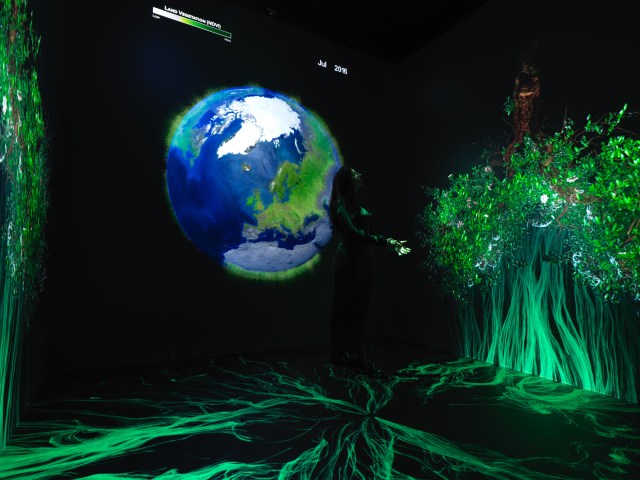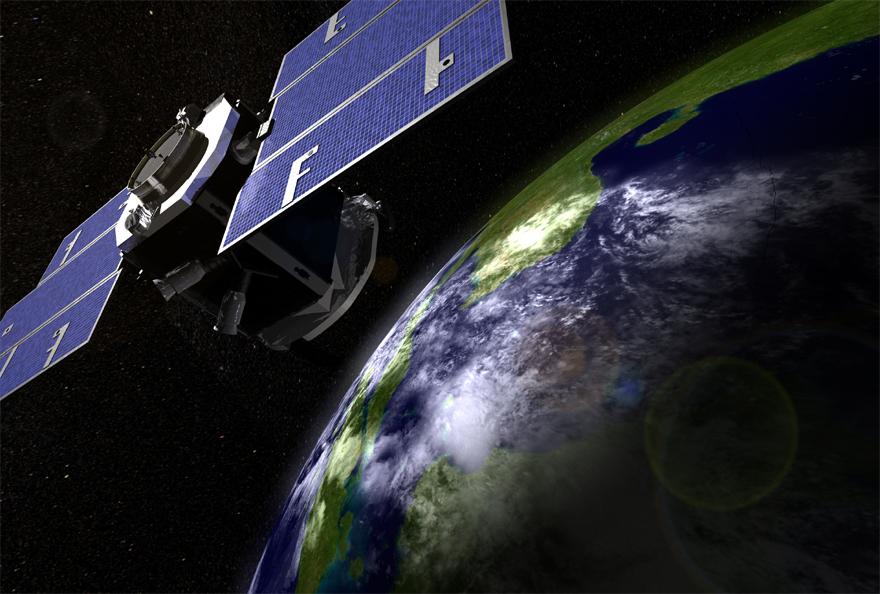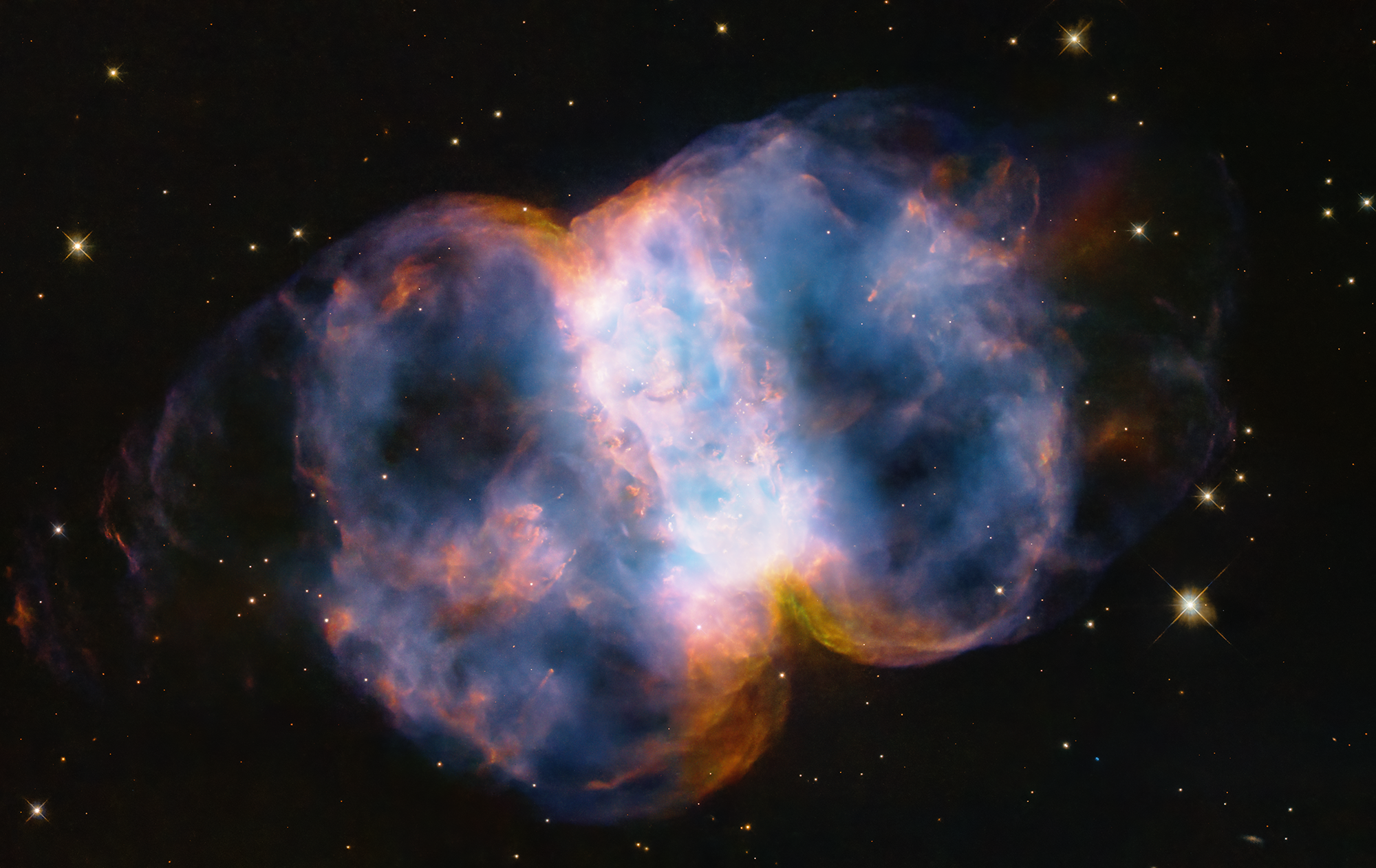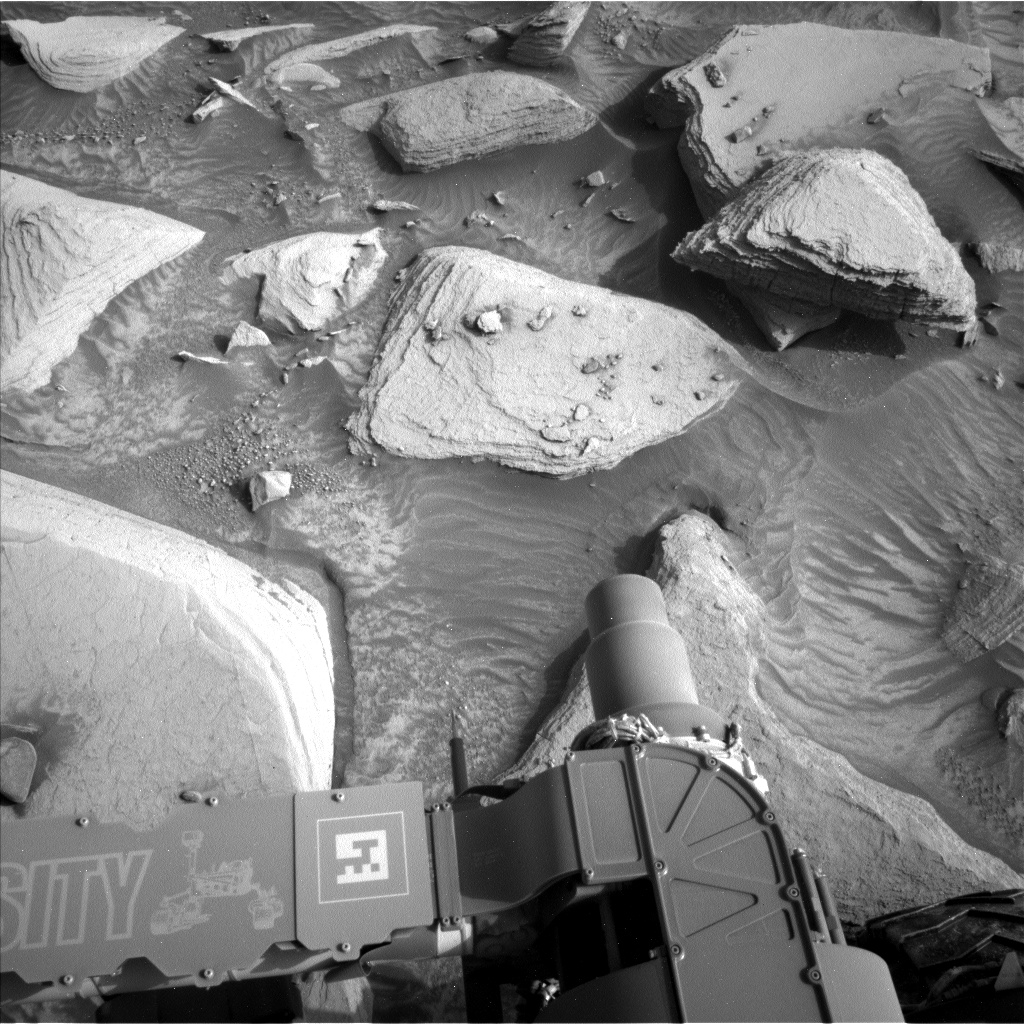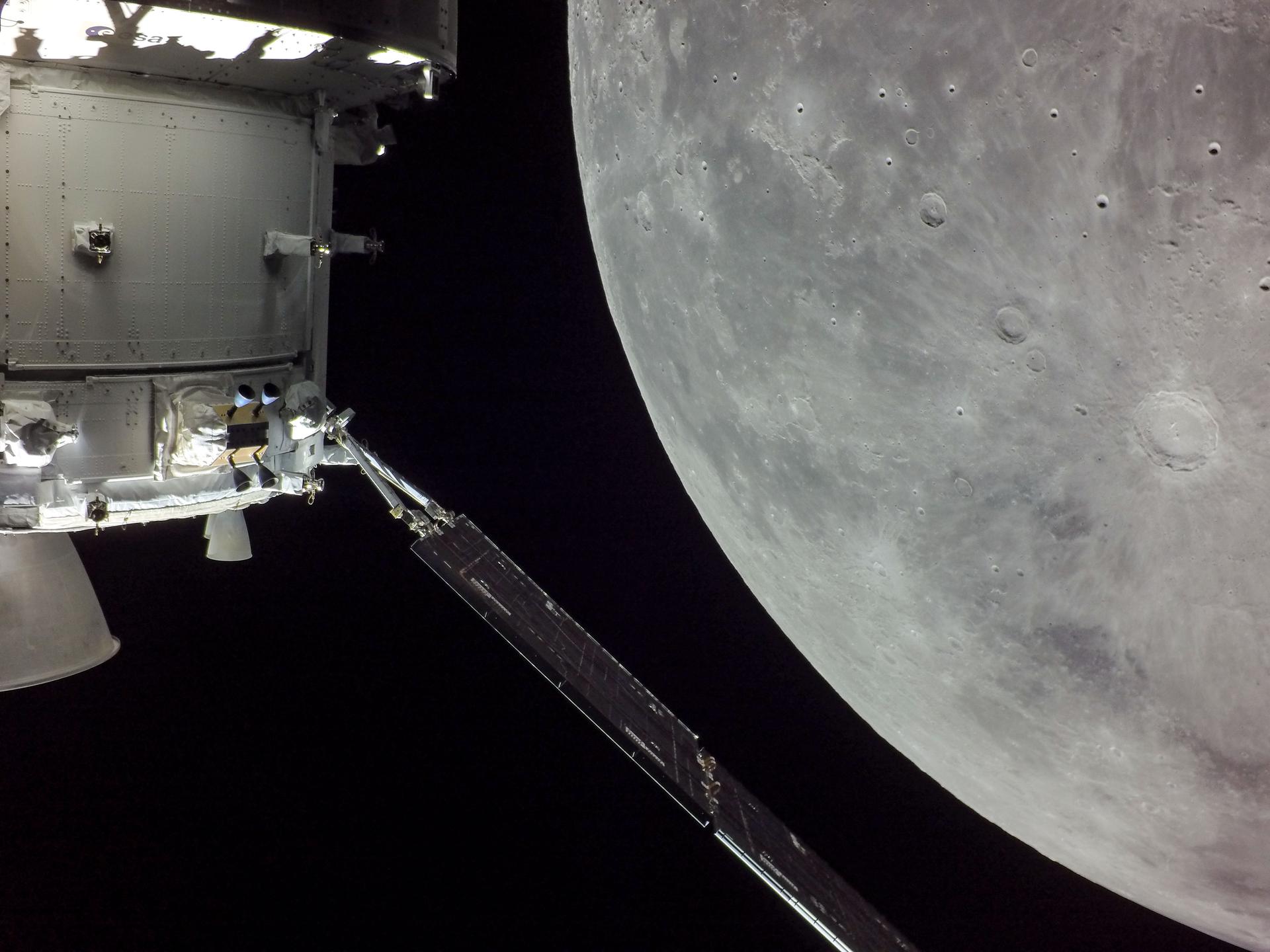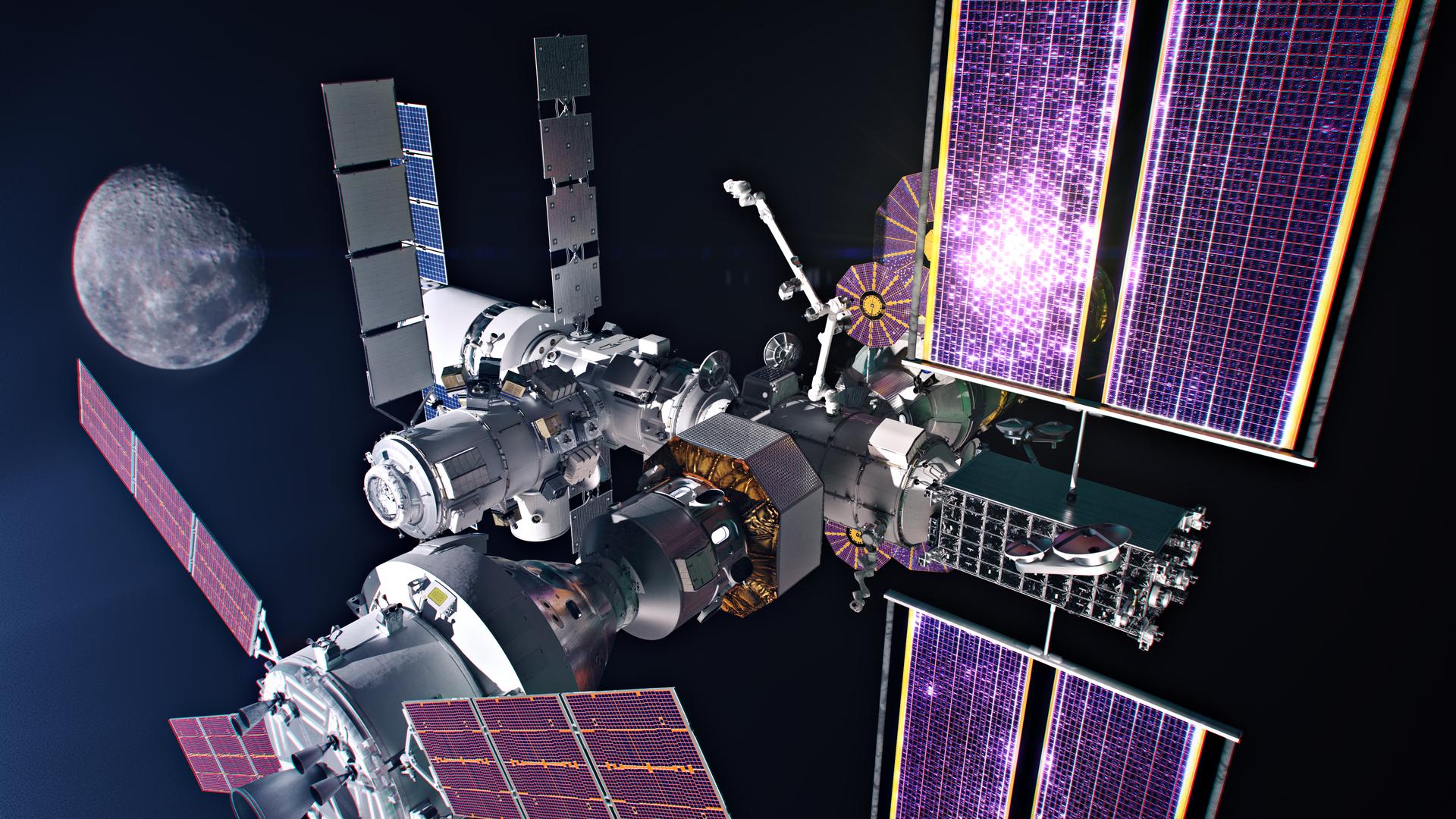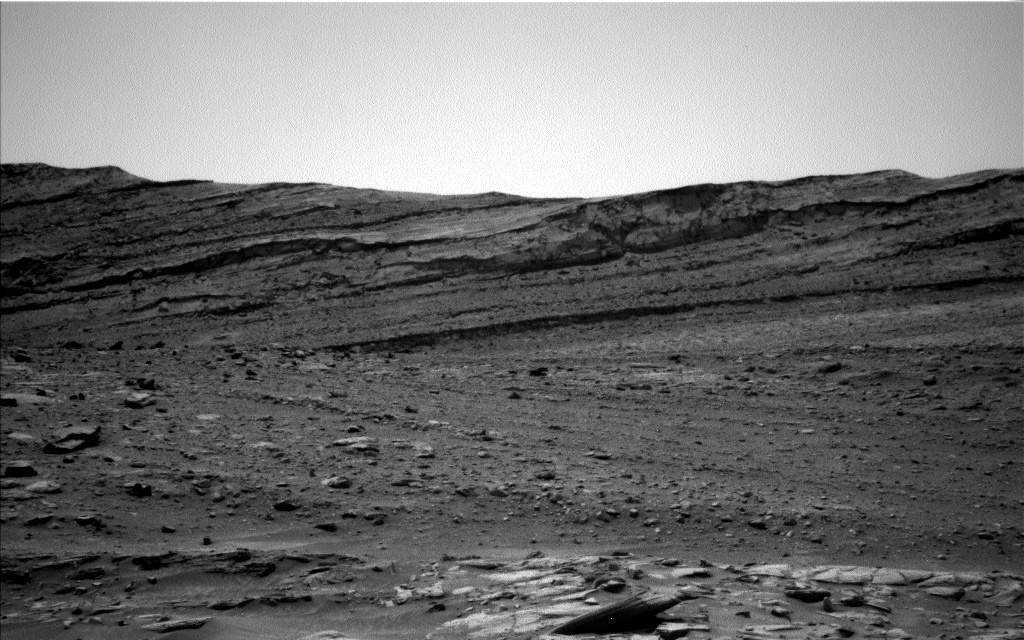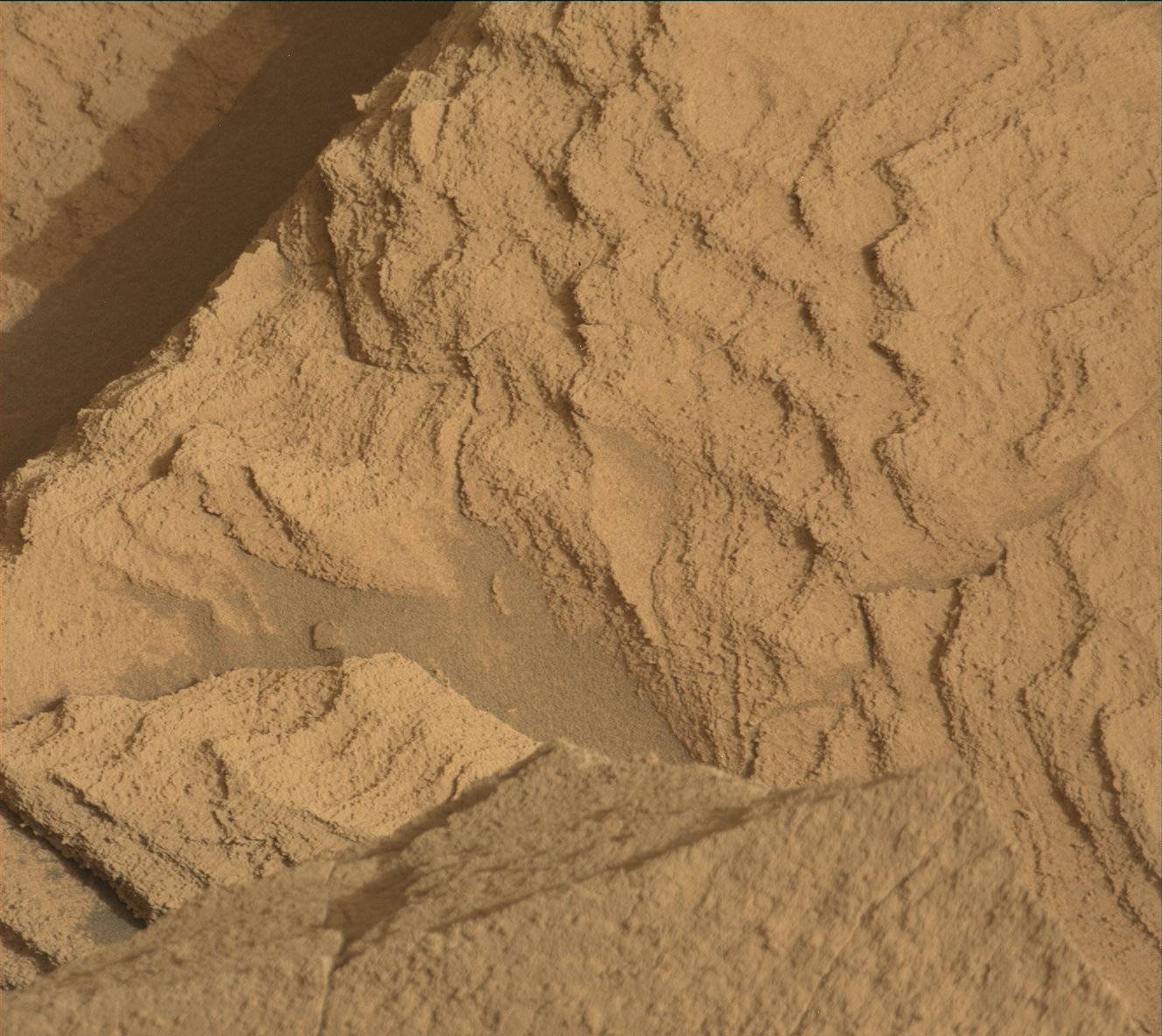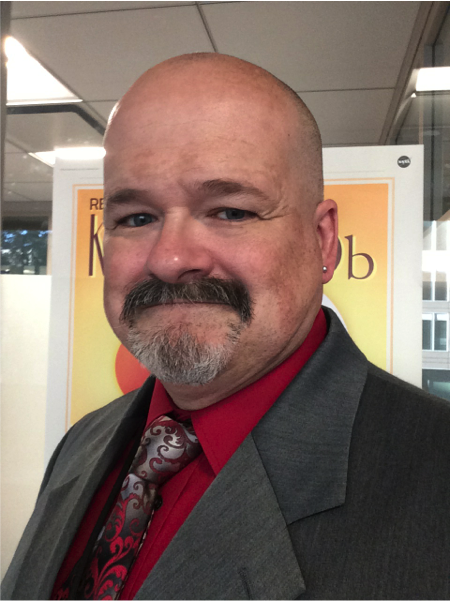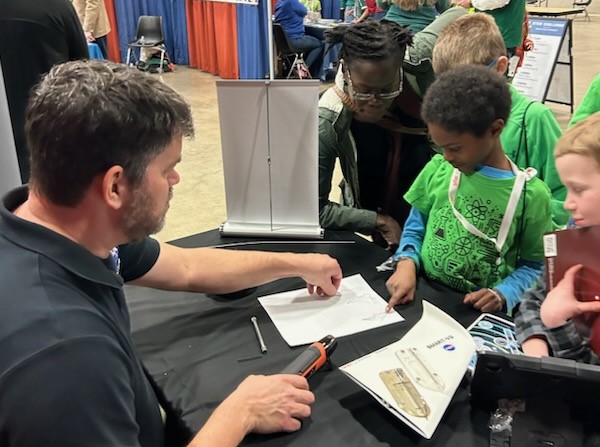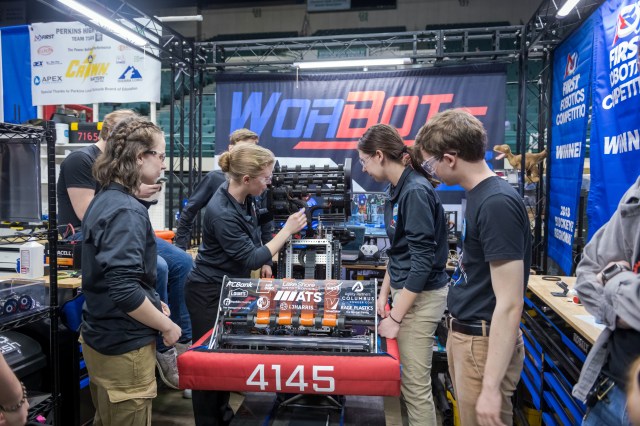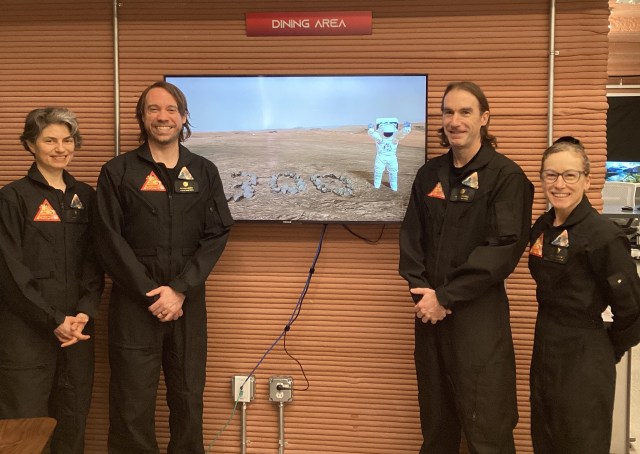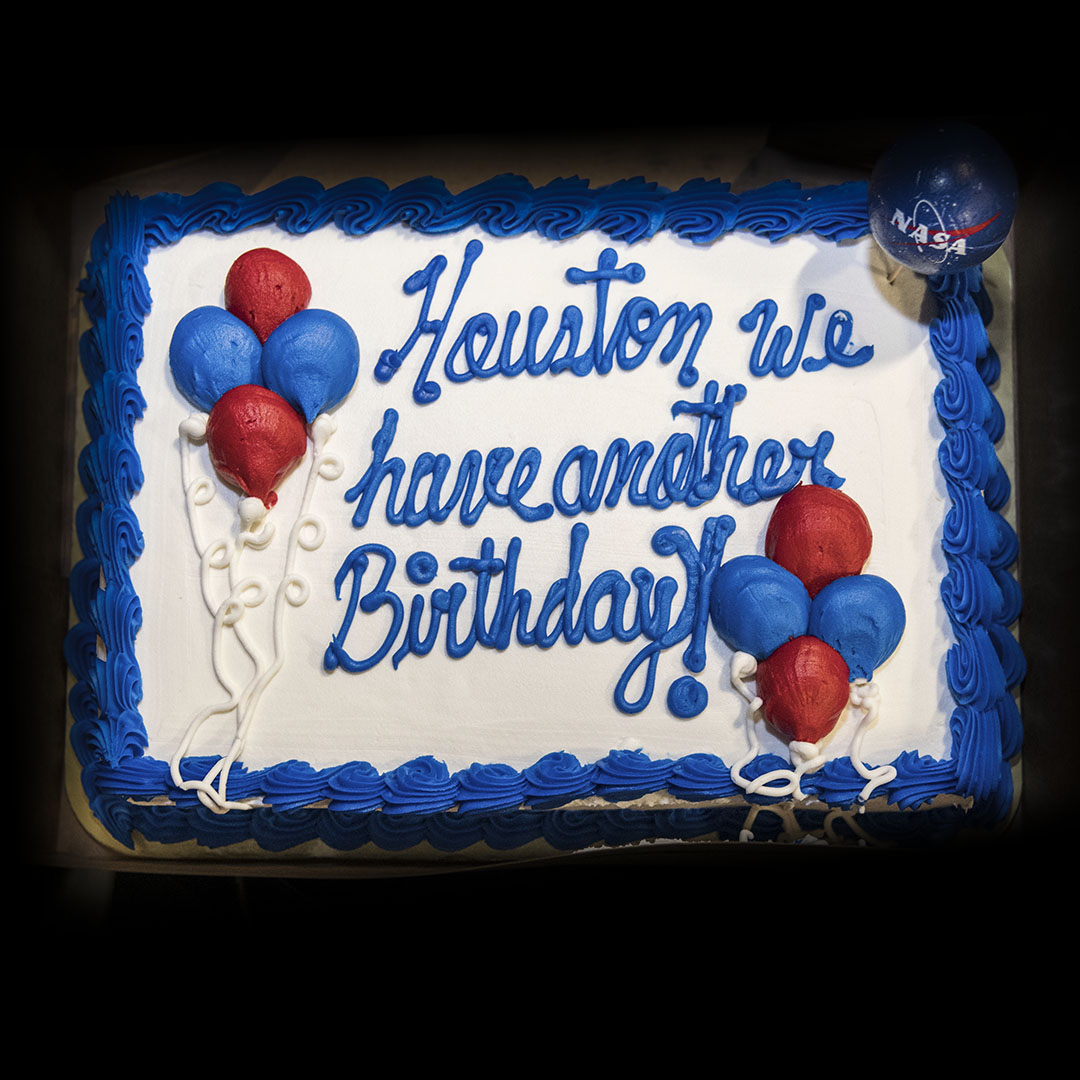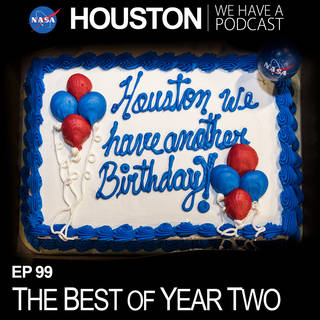
“Houston We Have a Podcast” is the official podcast of the NASA Johnson Space Center, the home of human spaceflight, stationed in Houston, Texas. We bring space right to you! On this podcast, you’ll learn from some of the brightest minds of America’s space agency as they discuss topics in engineering, science, technology and more. You’ll hear firsthand from astronauts what it’s like to launch atop a rocket, live in space and re-enter the Earth’s atmosphere. And you’ll listen in to the more human side of space as our guests tell stories of behind-the-scenes moments never heard before.
Houston, we have a birthday! Episode 99 is a special episode to celebrate two years of Houston We Have a Podcast. Host Gary Jordan sits down with audio engineer Alex Perryman, co-host Pat Ryan, and co-host Dan Huot to talk about their favorite moments from this past year of episodes. This episode was recorded on June 17th, 2019.
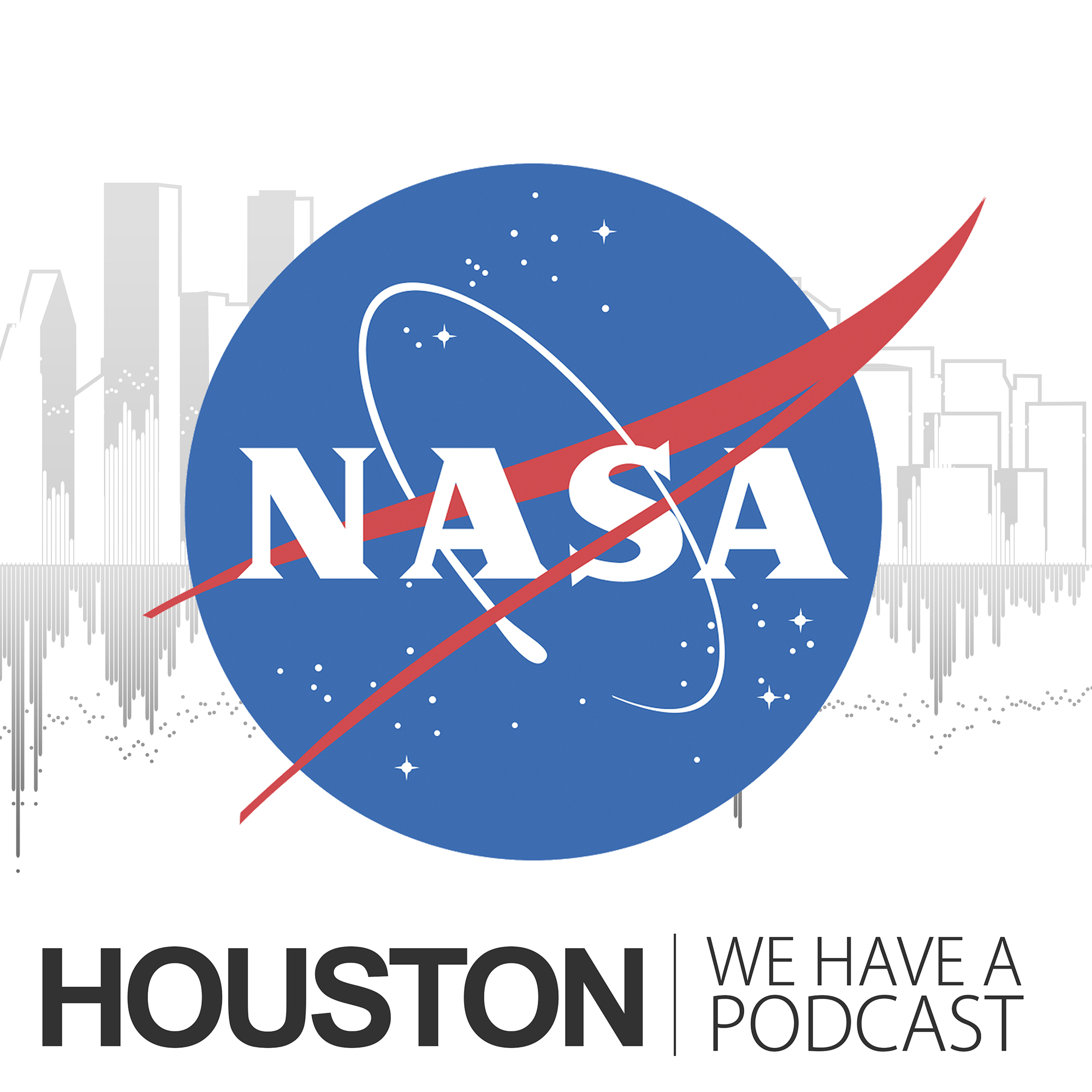
Transcript
Gary Jordan: Houston, we have a birthday. Welcome to the official podcast of the NASA Johnson Space Center, Episode 99. I’m Gary Jordan and I’ll be kicking off this discussion today. Two years ago, this week, we launched the very first Episode of Houston, We Have a Podcast and what a ride it has been. We’ve brought in so many scientists, engineers, astronauts to talk about a huge variety of topics, and to share some of their incredible stories. So, to celebrate another great year of Houston, We Have a Podcast, the podcast team is going in front of the mics once again to talk about our favorite moments from this past year of Episodes. Today, I’m sitting down with producer an audio engineer Alex Perryman, as well as producer and host, Pat Ryan, and host, Dan Huot. So, if you’re new to the show, this should give you some great perspective on some of the conversations we’ve had so far. Happy birthday to us! Let’s jump right ahead to reminiscing with the podcast team. Enjoy.
[ Music ]
Gary Jordan: One more year down, guys. We are two years into the podcast. How’s everyone feeling? Alex, how you feeling two years in?
Alex Perryman: Feeling good.
Gary Jordan: You were one of the original people that actually helped to start this off. Does it feel like two years?
Alex Perryman: Yeah, it feels great, you know, it feels nice to be the — the OG in the group.
[Laughter]
Gary Jordan: That’s true — well, you — you definitely — it was me and you definitely from the beginning. Dan, you actually were part of Episode 1, which was more like the introduction to let’s see if we can do this.
Dan Huot: Yeah, let’s — let’s see how bad and we are make sure we can actually do this and then try to fix it.
Gary Jordan: That’s why the first four minutes of that Episode do not exist.
Dan Huot: They never, ever saw the light of the day.
Gary Jordan: Well, that’s what it was, it was us trying to figure this out. And then we got where — I feel like this is like a regular thing now, we’re doing it — we’re doing it weekly and now we have –Alex, you’re part of the regular team. Pat, now you’re part of the regular team and have been for over a year now?
Pat Ryan: Probably — yeah, a little over a year.
Gary Jordan: Okay, and we have Norah who’s behind us snapping pictures.
Pat Ryan: Hi, Norah.
Norah Moran: Hi.
Dan Huot: She’s pointing bright lights in our eyes.
Gary Jordan: All right, so today, I’m going to do — remember how what we did last year, basically, just sat down and sort of reminisced, pulled out our favorite clips. I’ve pulled out some of my favorite moments and I hope you guys have done the same, and just want to go from when I guess the day the — the week — sorry — after the last birthday Episode. So, starting with that week, Episode 53 was Stan Love.
[Transition Music]
Stan Love: And by the way, the toilet is part of your water and oxygen supply, just —
Gary Jordan: Ah, so if the toilet breaks, that also means that you’re going to be able to —
Stan Love: Yeah. Yeah, what a way to die, right? I was going to be the brave first explorer on Mars and I died because the toilet broke, that’s not going to look good.
[Transition Music]
Gary Jordan: And actually, I looked online, this Episode — sorry, Dan, beat the Episode 1 with you.
Alex Perryman: Yep.
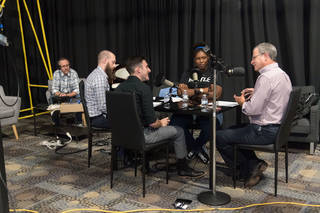
Gary Jordan: This one now has the most downloads of any Episode that we’ve ever done.
Pat Ryan: Well, it is Stan Love.
Dan Huot: Now my life is meaningless.
Pat Ryan: Now?
[Laughter]
Dan Huot: Thank you, Pat.
Gary Jordan: A lot of love in this room.
Pat Ryan: Now you’re paying attention.
Gary Jordan: But interestingly enough that one was actually — almost didn’t happen because Stan Love, we were supposed to record for two purposes, one was to try to see how much time we had and maybe we can get another Episode out of him. But really, Stan Love was supposed to record extra audio clips for the hazard series we were doing with human research program because we got together all these different people that they laid out, that they wanted to talk through these five hazards, and Stan Love and Mike Barratt were going to add to that from the astronaut perspective. I forget exactly what happened. Alex, help me remember. I think like we were supposed to record in this room where we are Studio A.
Alex Perryman: Yes.
Gary Jordan: But I think everything — everything was doubled booked.
Alex Perryman: Everything that could go wrong went wrong that day.
Gary Jordan: Yes.
Alex Perryman: It was to the point where I think I was double booked as being the audio engineer.
Gary Jordan: What were you supposed — what were — what were you doing instead?
Alex Perryman: There was a — I think there was like an in-flight event going on, so there was like a live event going on, and in some kind of way, this room got double booked and we were the smallest thing on the chain, so we got kicked out of this room. And then we ended up having to go into a closet that’s next to a bathroom.
Gary Jordan: Well, we have — we have — we have this studio, right? We have Studio B, we have another studio, and we have a sound booth, and all three of those were taking up.
Alex Perryman: Yes. Were taken.
Gary Jordan: So we ended up going literally into a closet next to the bathrooms. Actually, if you listen to that Episode, you can hear a little bit of foot traffic in the background of people going back and forth because we had to get jammed to do that — but what was interesting is Stan Love absolutely loved recording that Episode.
Alex Perryman: Yeah.
Gary Jordan: He’s — he had another conflict that he was backed up right against to record this Episode and he goes, don’t worry about it. He goes, I can — I can spend another 30 minutes. We recorded an extra 30 minutes, got everything, got this solo episode and all the clips used for hazard series and at the end, he’s like, if you ever want me to do this again, like let — just let me know and I’ll — and I’ll come out and come on and do that again, so we have to have Stan Love back.
Dan Huot: And that — it doesn’t surprise me that he’s one of the top episodes because he’s such a good storyteller.
Gary Jordan: He is.
Dan Huot: He’s been giving the talks about why going to Mars is so hard and things like that for years and it’s captivating.
Alex Perryman: Yeah.
Dan Huot: Because he takes something that’s just obviously one of the hardest things humanity could ever do and he boils it down into oh, I can actually understand how why this is so freaking hard to pull off.
Gary Jordan: And actually, if you go online, the reason that — while I had him for this hazard series that I wanted to focus on this specifically is because he’s done a lecture. Just like you said, he’s been doing the same lecture, but there’s like a 40 minute online thing you can find on YouTube somewhere, where he goes through why Mars is hard. And what I did was I organized a sort of topic based script. And wanted to hit as much as I could to replicate what was in that — that talk but I couldn’t hit everything because I had such a short amount of time with him, so we’ll definitely have to have him on. But that’s where we kicked off the hazard series, that was — that was part of it. Working with Mel Whiting and the human research program. Mike Barratt was the same way too.
Alex Perryman: Yeah.
Gary Jordan: I recorded him in the studio. We did his — same thing, I wanted to do an episode solo with him, and I wanted to do some clips for the hazard series, but we ran out of time. And he goes, you know what? Just schedule more time with me, I’ll be happy to come back, and we — and we’ll redo this. And I sent him the new script and he — and he literally did more research on each of the hazards to make it as good as possible.
Pat Ryan: Gee.
Gary Jordan: So, that — so that episode, the one with Mike Barratt is — the first half, where we were talking about his story, was the first time we recorded. And the second half, which is just the five hazards, was the second time we recorded, where he researched all of the different things, and they’re back to back, and I think that was one of the longer episodes we have, like an hour thirty. But those also did pretty well in terms of downloads, all of the different hazards, Zarana Patel, Tom Williams, Erik Antonsen, when we recorded with those guys, Peter Norsk, Brian Crucian, those actually performed a lot better than some of our other stuff.
[Transition Music]
Gary Jordan: Yeah, and — and if — and if I’m going to the dentist and they’re going around the corner when I’m getting blasted with x-rays, I’m sure no one is really going to sign up for — to get blasted with, you know, radiation as to find out what happens in your body.
Zarana Patel: Yeah, no one — unfortunately, we cannot irradiate people.
Gary Jordan: You say that from a scientific perspective.
Zarana Patel: Yes. Yes, of course. So, we rely heavily on animal and cellular models to gather the evidence we need to characterize the risk from space radiation and to do — evaluate countermeasures.
[Transition Music]
Gary Jordan: And that’s why I think why we continued with more and more series after that one.
Alex Perryman: Yeah.
Gary Jordan: Because this was sort of a pilot. This is when we did like the going back in time for the International Space Station Begins for the 20th anniversary of the first element launches and stuff like that. Going through, I’m just kind of hitting these different highlights right now. But Episode 63, that was an interesting day because Pat, you were trying to dedicate that day to recording John Hanson for the Heroes series. But we got — again — kicked out of everywhere. But this time, it was –
Pat Ryan: Starting with this room.
Gary Jordan: Starting with this room that we’re in right now but it was not something that we could undo because the Vice President, Mike Pence, was coming here.
Pat Ryan: Yeah.
Gary Jordan: And Jim Bridenstine, the administrator had a whole day planned. So, Pat, what did you have to do to accommodate John Hansen?
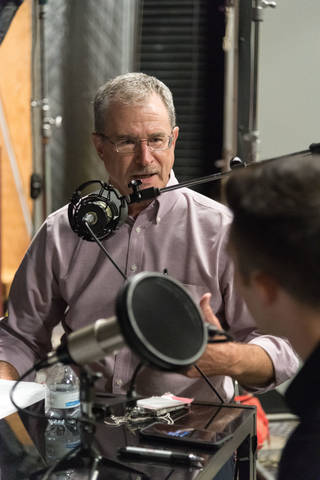
Pat Ryan: Well, the week before, my interview that we had scheduled with Hansen — and he had agreed to fly in from Dallas to come down and do the whole thing. And the week before, we found out that the Vice President was coming, it was a big surprise, I mean, you know, secret at the time, but we couldn’t be in here. This Studio A is only a couple hundred feet from the auditorium where the Vice President was going to be, so the Secret Service had commandeered the room. And we were made to look someplace else in a different building. And we ended up in a — in a conference room in the astronaut office, over in the astronaut office building. And that was okay, but that was a room that we couldn’t even get into without somebody’s help because we — we didn’t — none of us have the — the clearance to get into that building. But on Monday morning of this week, we were going to do the interview with Hansen on Thursday afternoon. After we’d been told that we couldn’t come in here, even after we had shifted the time, on that Thursday morning, we were told that the administrator needed to move his podcast, which had been in the morning, to that afternoon to the same time that our interview with John Hansen was going to be. So, at 8 o’clock in the morning, I’m emailing Hansen in Dallas saying, can we move this to another time. And he said, yeah, sure, but I got to go now, I got to go to the airport. So, that left us in a room that we couldn’t really access without the help from somebody who was actually in that building. We went over there in the morning and set up to do an interview with Mr. Bridenstine and the JSC Center Director Mark Geyer, and then had to leave because everybody had other things to do for the whole Vice President Commercial Crew Palooza that was going on. So, the — by the time we went back over to the other building in the afternoon for you to talk to Mr. Bridenstine and Mr. Geyer, Dr. Hansen was showing up in what was the middle of that interview, so he got to come — actually come into the room and see the end of that, which was something that we hadn’t planned for him. And because we were there later in the day, when we left, we get to go down in the elevator with Doug Hurley, who is one of the Commercial Crew astronauts, who had just been announced that day, so that was kind of a treat for Dr. Hansen too. But it all happened in a way that was not the way we had it carefully planned out, shall we say.
Alex Perryman: Do you know what? That was also the same day that me and Norah had to go do another shoot with the administrator in another building and it was scheduled right after the podcast ended that shoot was supposed to start. So, me and Norah were trying to book it out of there to get to that building before he got there, and hopefully, everything was still set up. And we were — we were the first ones out the — out of the room, but they grabbed the elevator before us so we had to like kind of patiently wait and then run to beat them in. And we beat them by like maybe like 30 seconds. And then like the administrator just kind of looked at me and Norah, like I just — I just saw you guys. And then he’s like wow, you guys got over quick.
Pat Ryan: Stop stalking me.
Alex Perryman: And I looked at him, I was like, do you believe in magic? And then he was like huh? And everyone just started laughing. And I was like, I’m a wizard, that’s why they call me the audio wizard.
Gary Jordan: That’s true. A flashback to a year ago where I think I first called you the audio wizard when I think it was John accidentally deleted all of the files and you had to resurrect — literally resurrect the files from out of nowhere, so that’s why you are the audio wizard.
Pat Ryan: That’s a story that never gets old.
Gary Jordan: Yes, it is. That was — that that was interesting too because for the Jim Bridenstine, Mark Geyer podcast, we scaled it up a bit, so there was — it wasn’t like this. Like right now, we’re kind of scaled down a bit. We have a portable audio recorder, we have microphones, but this is — we had like the whole set. We had — we had —
Pat Ryan: It was on video.
Gary Jordan: It was on video. Yeah.
Alex Perryman: Exactly.
Gary Jordan: So, we scaled it up a bit to make that happen.
Pat Ryan: And now it’s on YouTube, so you can see it.
[Transition Music]
Jim Bridenstine: Yeah, as we’ve talked about sending American astronauts on American rockets from American soil, all of that is fantastic, but these commercial crew providers, in many — they have seats, they have seven seats on their space craft, which means we could be flying tourists to the International Space Station.
[Transition Music]
Gary Jordan: Episode 64 is where we have Norah Moran come on. [Cheers] Yay, Norah! Guys, if you’re looking at — if you go to Houston, We Have a Podcast, the pages on nasa.gov and see all the cool pictures all throughout some of the different shoots and different moments that we’ve done, that is all Norah making that happen, even gifs and stuff on the last one. I remember the splash was, it’s Spaceship Crash Testing, you put a gif in there, that was pretty cool. So, welcome to have Norah on the team. Bill Stafford was a great help as well. Episode 65 with Nick Hague, that was an interesting episode.
Alex Perryman: Yes.
Gary Jordan: Because what we do to record astronauts is, we have a certain amount of time that we try to get a bunch of different products. We try to get astronaut moments; we try to get all these — mostly video products but have recently introduced the podcast. And when Nick Hague came on, we knew that his wife, Catie Hague was going to come and we had this idea, maybe we should bring her on the podcast. Problem is, we didn’t tell her. We didn’t give her the heads-up that she was going to come on the podcast. So, when you hear Catie Hague come on, that is her genuinely reacting to, oh, okay, I guess I’m doing this because she literally had no idea. But she handled it like a champ, she’s a public affairs officer herself, so she — I think she’s very much used to all of that.
[Transition Music]
Nick Hague: But it was eye-opening because of that stark difference.
Gary Jordan: Eye-opening and cold. You seem to like cold places.
Nick Hague: I’ve changed that now, right?
Gary Jordan: Yeah, now being in Houston a little bit differently. At what point did you meet your wife, Catie?
Nick Hague: Speak of the devil.
Gary Jordan: Hey. Catie, you want to come here?
Catie Hague: Sure.
Nick Hague: You can participate.
Catie Hague: Do I have a choice?
Gary Jordan: You don’t have to.
Nick Hague: We’re doing a podcast.
Gary Jordan: Yeah.
Catie Hague: Fun.
Gary Jordan: So, was this — did you guys meet during your bachelor’s or —
Nick Hague: Yeah, so at the — at the Air Force Academy, at the Air Force Academy. We both graduated in 1998, so we were in the same squadron the last two years there. It’s kind of funny, you know, we had lunch together every day for two years.
Gary Jordan: Really? As friends?
Catie Hague: Right.
Nick Hague: We didn’t — we didn’t get married until two years after graduation.
Gary Jordan: Oh, really? Okay.
Nick Hague: So, yeah, it was just —
Gary Jordan: So, what were you studying? Were you studying — were you similar programs?
Catie Hague: I was studying law.
Gary Jordan: Law? Okay, so not similar.
Catie Hague: Not similar.
Gary Jordan: But just same kind of —
Catie Hague: I am not as smart on the technical side, let’s put it that way.
[Transition Music]
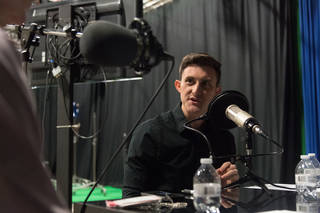
Gary Jordan: But what’s interesting about that, Dan, is this sparked a whole series of episodes with astronauts and their spouses, that’s when you recorded was with Christina Koch.
Dan Huot: Yeah and it’s cool to get the spouses in there too, just because it helps you get kind of the full encapsulation of their story. Astronauts are — I mean even for us here at NASA, almost these mythical beings, where they’re all steely eyed missile men, or insane scientists, and all of these super accomplished people that you forget, like, these are people. And so, having their spouse on and just you learn about the strength of the family that surrounds a lot of these people and the support that they get, and it’s like the support that anybody else out there in the world relies on, they’re just the same.
Gary Jordan: Yeah, that was huge. I think talking with astronauts, I absolutely love the privilege. I know that was a big theme for the most recent episode, Drew Morgan’s podcast, where Stacey came on. My favorite though was Episode 74, Anne McClain. I remember earlier that year, every year, my family does a family reunion around July timeframe, and I ran into an uncle there that actually doesn’t normally come to those things, so it was kind of cool seeing him, my Uncle Mike Jordan. And he is a helicopter pilot for the Army and happened to bring up Anne’s name, like, you wouldn’t happen to know an astronaut named Anne McClain, I’m like, yeah, I think, I think I do. And he said, tell her I said hi. And I go, okay. And in my mind, I knew later that — a couple months later, I was going to be recording this with Anne McLain, did not tell her at all that I was going to bring up my Uncle Mike, so again, genuine reaction when I brought her up that she was going to be doing that.
Pat Ryan: Yeah, well, you couldn’t see it on the podcast, but her eyes got real big when Gary said, do you know a guy named Mike Jordan. And she goes, how do you know him? [Laughter]
[Transition Music]
Gary Jordan: All right. So, I’m going through the different types of aircraft and I’m definitely not going to list them all, but one of the ones that stuck out to me was the C-12 — is it Huron King Air?
Anne Mcclain: Mmhmm.
Gary Jordan: King Air. Did you — were taught by a pilot, Mike Jordan?
Anne Mcclain: How’d you know that?
Gary Jordan: That’s my uncle and he says, hi.
Anne Mcclain: Really?
Gary Jordan: Yeah.
Anne Mcclain: I was. That’s very funny and it’s funny that — because I was actually just talking about him, you can tell him that.
Gary Jordan: Really?
Anne Mcclain: Because he has this incredible way of teaching, where he is very charismatic.
[Transition Music]
Gary Jordan: I think another thing we did pretty well this year was trying a bunch of different live shows.
Alex Perryman: Yeah.
Gary Jordan: If you remember Episode 67 with writing excuses, that was actually months in the making to try to make that happen. We got a tip from actually some engineer who happened to know one of the authors, knew they were coming on, and we just kind of scaled this thing up to eventually, it became a podcast and an internal event where we did everything on stage.
[Transition Music]
Mary Robinette Kowal: That has just come out as a book.
Dan Wells: As a book, yes, it’s called How to Invent Everything. And the idea is that if you accidentally get thrown into the past, you will be able to recreate electricity, and penicillin, and all these other things, so that’s a pretty nice one to have.
Howard Tayler: So, that book wrapped in a towel.
Kjell Lindgren: All right, so from personal experience, I would say a spoon.
Dan Wells: Now we’ll tell you the real answer.
Kjell Lindgren: This is for low Earth orbit, I’m not saying planetary, you know, a spoon is important.
[Transition Music]
Gary Jordan: A fun fact about that one. Actually, I’m — I actually still talk with Mary Robinette Kowal, she’s actually —
Alex Perryman: Really?
Gary Jordan: Yeah, she’s actually — yeah, she’s a really cool person and always is interested to find out what we’re doing even now and is still an active listener of the podcast. But interesting part about that live performance is I — or performance — but live presentation, I was kind of nervous that the crowd wasn’t going to react because I was — in my head, I built up this like grand event and we probably — we probably got I say a hundred people at the — at the Teague Auditorium, which is better than I think I was expecting, but it was still like I imagined 700, right? So, before we recorded the podcast, I said, hey, everyone, if you can give a big warm JSC welcome for this podcast, that would be amazing. Okay, we’re going to start recording now. Hey, everybody, welcome, to the first live recording of Houston, We Have a Podcast, and the erupted.
Dan Huot: Yay.
Gary Jordan: Yeah, it was great. I know, Dan, when you did the Gates McFadden one —
Dan Huot: That’s what happened. [Laughter]
Gary Jordan: When you did the Gates McFadden one, they erupted, and I think you had the benefit of having Gates McFadden there, a highly recognizable character. As soon as you said her name, the crowd went nuts.
Dan Huot: Definitely, definitely helped. And we had — I don’t know if we ever got the final count, but it was a couple hundred, but I mean that was at a big public event.
Gary Jordan: Yeah.
Dan Huot: That wasn’t just a kind of NASA employees thing, that was at Comicpalooza here in Houston, so you could had a captive audience of thousands of people in a giant convention center who were crazy about comic books, and sci-fi, and science, and things like that, so we picked a pretty good spot to go do a great big live one.
Pat Ryan: They put us in a room where they said seated 1,500 people and it was half full.
Dan Huot: Yeah.
Pat Ryan: So, there was a good 7-8 hundred people
Dan Huot: We went on right after Wilmer Valderrama.
Pat Ryan: That’s right.
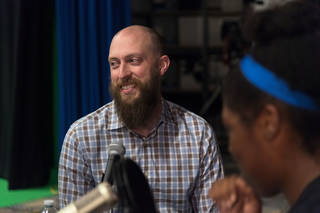
Dan Huot: Which was really — it was really cool to see him. He was talking about ’70 Show and stuff like that, but we went on right after and that was — that was just an incredible panel of people. You had Gates McFadden, who — accomplished actor directors, done choreography, a million different things, and was on Star Trek, you know, one of the most iconic sci-fi series. You had Serena Auñón-Chancellor, NASA astronaut, who was just on board the space station, she’s also a medical doctor and has done all kinds of insanely cool, and interesting, and unique things throughout her lifetime. And then we had two medical experts at NASA, one of which who’s kind of on the leading edge. And one of the things that came up repeatedly during their introductions was none of these people only had one job in their life. Every single one of them was, you know, Gates, actor, director, choreographer, all these. Serena astronaut, doctor, and this guy was doctor, and he was a pilot in Canada for the Air Force Reserve. And then our final panelist was somebody who’s been doing space to life sciences for astronauts since Apollo, so just the breadth of knowledge, the experience. And then I’m sitting there, like, hi, I’m Dan. [Laughter] I make funny videos sometimes.
Pat Ryan: Intimidated much?
Dan Huot: But then we had a couple of hundred people and it went fantastically, I mean it was in the middle of one of the Houston monsoons, so we all had fun getting into the center. I parked maybe five minutes away and then Ubered. A five-minute walk and then I Ubered because it was just pouring down rain, but it was a blast.
Gary Jordan: Wow, do you know what? I think — I was sad to miss that one, but it sounded like a really good time. And I know just listening to it afterwards, I think what was great is that the panel was engaged with each other, they were sort of bouncing off — and even Gates I think was really — she was like genuinely curious.
Pat Ryan: She was asking some of the best questions.
Gary Jordan: Right, she was. She was doing great.
Dan Huot: She looked at me 2 minutes in and she’s like, hey, can I ask questions? Is that okay? I was like, by all means. Go, make it so.
Gary Jordan: Alex, you’ve had your fair share of recording podcasts. I guess that was the first time you recorded that podcast outside of here.
Alex Perryman: Yeah.
Gary Jordan: But you’ve recorded an episode of Gravity Assist and you’ve talked to a bunch of people about recording the podcast, what’s that been like?
Alex Perryman: It’s been a blast. You know, working on Gravity Assist, I felt, you know, like I was cheating on our podcast because I was like, oh, how — how can I do this? How can I record someone else’s podcast? But it was a lot of fun.
Pat Ryan: Traitor.
Alex Perryman: I’m not a traitor. I came back.
Pat Ryan: You could’ve made a mistake.
[Laughter]
Alex Perryman: Well, no, it’s been a blast doing it, and just talking to people who aren’t in the NASA community about our podcast and seeing how excited they are about it. So, back in May, I went back to Full Sail University where I went to for their Hall of Fame week, and it’s this huge week. This year was the 40th anniversary, and it was the 10th Hall of Fame, and I’m standing there looking at all these amazing people who have Oscars, and Emmys, and Grammys, and what they’re doing, and I’m like, oh yeah, I’m the NASA girl here, but you know, I was still excited. And then I had one person walk up, his name is Gary Rizzo, and he just won an Oscar last year for his work for sound mixing on Dunkirk.
Gary Jordan: Oh cool.
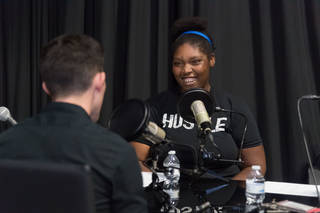
Alex Perryman: And he walks in and he goes, hey, I wanted to talk to you about the podcast, I love it. And he started talking about his favorite episodes, and I’m like, what is going on here? I was like no way. Are we really talking about my podcast? I was like, well, I know another Gary who would be very happy to hear you say that.
Gary Jordan: I am very happy, that is awesome. That’s really cool. Yeah. Yeah, so what’s it like mixing the podcast? What do you tell people about how you actually do podcasting? I guess versus — that versus like the other stuff you’re doing for space.
Alex Perryman: Well, see, you know, it’s really interesting because a lot of the people that I talk to when it comes to mixing, they’re off into mixing music, whether it’s — mixing music live or mixing it, you know, for TV. And then they ask me, so how is it mixing at NASA and trying to do a podcast? And I was like you have to remember, mixing is mixing, whether you’re singing or talking, right? So, some of the same tips. But our environment is a little bit more unique than others, and so I think that’s what makes it more exciting and that’s what gets people, you know, outside of our community — our NASA community excited about what we’re doing here is that it’s like, wow, Alex is mixing, and there’s astronauts on here, and there’s — she’s talking to all these amazing people. I’m like, but you just did a show with a — you know, a superstar.
Gary Jordan: Yeah.
Alex Perryman: A packed house and you want to talk about me doing a podcast that one of them I had to record in the closet.
Gary Jordan: Well, I think that’s the best part is that we’re reaching like different folks, you know? Like, just with Gates McFadden, right, we’re reaching like the comicpalooza category, and with you, we’re reaching like the audio engineer, like people who are in film, and wouldn’t normally be exposed to like space — spaceflight and stuff. Episode 68, we recorded with some headquarters folks, Bob Jacobs, Bill Barry, and Bert Ulrich. And at that time, they did a couple interviews at the Cape with people of the First Man.
Alex Perryman: Yes.
Pat Ryan: The cast members.
Gary Jordan: Yeah, the cast members, that’s it, cast members, and crew, and director, and like all that. And we pulled those interviews in and got some — got a little bit of Hollywood into the way that we’re doing stuff.
[Transition Music]
Bob Jacobs: You know, they said, oh, we have these air conditioned tents, and I got into the first tent to interview Ryan and Claire and noticed that these huge tubes of AC were pointed at the actors.
Bill Barry: Not at the interviewers.
Bob Jacobs: The rest of us — the rest of us had nothing.
Bill Barry: I had one of those tubes pointed at me, Bob, I was okay.
Bob Jacobs: And it was — it was hot.
Bert Ulrich: It was horribly hot.
Bob Jacobs: You know, and it’s hard enough talking to these people without sweating, so let’s just add, you know, the Florida climate on top of it, and it was just a hot, miserable time, but everyone was really good about it.
[Transition Music]
Gary Jordan: I love kind of tackling all these different things and doing stuff a little bit differently. Pat, I feel like this is a good time to bring up the hero’s podcast.
Pat Ryan: Master the segue.
Gary Jordan: That is right.
Dan Huot: On another note.
Gary Jordan: Yeah. We’ve been doing —
Pat Ryan: Meanwhile —
Gary Jordan: Series and — and different audiences and stuff, this was just a completely different way of doing stuff. Tell me about the inception of this idea.
Pat Ryan: Credit for the start of it goes to that man in the corner, Greg Wiseman.
Gary Jordan: That’s right.
Pat Ryan: Say hi!
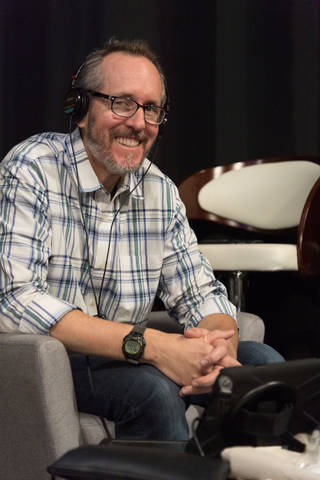
Greg Wisemen: Hello.
Gary Jordan: That’s right.
Pat Ryan: Greg is engineering this recording so Alex can sit up here, but Greg is another audio engineer here and he mentioned this story in a meeting that we had and I thought it would be real interesting. And it hit me as a fun thing to try to do. The story I thought was going to require talking to a number of people, not just one or two people, and that made me think of the podcast Serial, and I really liked that in the way that they talked to dozens of people and then find a way to weave those different interviews together in order to tell one story. I think that’s really cool and I decided I wanted to try it. Why not? We can. So, Greg helped me contact all the people that had pulled off the trick of rescuing the audio from the Apollo 11 mission control center and set it up — and set up interviews for all those people. Then the main character we referenced earlier as John Hansen, he’s a University of Texas at Dallas professor, and an expert nationally in the field of speech recognition and speech technology. We went through that whole soap opera that we talked about a few minutes ago about finally getting it set and doing that interview with him. And I sat there with him — we talked for about an hour and a half to try to get him to tell me the whole story of how he became aware that these tapes existed, and how they went through the process of getting them, and then trying to play them and finding out that they couldn’t. There was only one machine in the world, apparently, that would have been capable of playing these tapes that contained 30 separate sources on each tape. It’s a machine that’s right here in this building but it didn’t work, and they had to figure out how to make it work. And once they did, then they realized that they had no way to digitize those recordings and to do it in a way that would keep the recordings all linked to one another in time, in terms of when they happened in relationship to the other recordings that had happened. They went through and they finally figured all that out and it’s been very successful research from an academic point of view. The National Science Foundation folks were — crowed about it to us when we interviewed them. We talked to Hansen, we talked to a couple of his students that were involved in it, the National Science Foundation. Some people just out of history that had somehow dropped in on the story through Greg, as well as this long interview with Greg, and he’s still getting fan mail from that.
Gary Jordan: All right.
Pat Ryan: Yay! Yay! Yay! So, it was fun, it turned out. I got to talk to — we used eight different interviews. And oddly enough, the time when we finally — when I finally got the time without anything else going on to be able to concentrate and pull the pieces together and write the script was during the furlough when civil servants were gone, contractors were still here, and we were allowed to do work on things that did not require direct supervision, wasn’t much else going on, but there was that. And that was a task that was entirely up to me at that point, so I got to do it, and it took about a week. But I was able to knock out a script that we then — with Greg’s help, Greg and I were able to mold around and then and take all the interviews and find the pieces that fit together in order to tell the story and in a — in a cogent fashion, and I think an interesting one. So, yeah, I had a great time doing it.
Gary Jordan: We’ve definitely had a lot of positive feedback from that whole series because it weaves — like you said.
Alex Perryman: Yeah.
Gary Jordan: I think that style did the story itself justice because there are so many different elements to it. You’re not just talking about restoring this ancient piece of hardware to actually play the tapes, but then there’s this whole project to actually digitize them and then eventually do the research. But what NASA got out of it was digitized audio tapes that would have otherwise been sitting on the shelf for who knows how long, but it actually worked out.
Pat Ryan: Well, and two follow-ups on that, if you will, I did not listen to all 19,000 hours of the tapes in order to do this, but I think John Hansen did or pretty nearly. He listened to thousands of hours and when he talked about it with me, he was really — I found really endearing in the way that he relayed just how cool this was to him to be able to hear all this stuff and to talk about some of the unusual things that he heard being said. One that I really liked was at one point in the conversation, he told me about the great surprise to him when he was listening to audio from Mission Control but heard television commercials from 1969 being played on there, including some for [gasp] cigarettes, it’s almost the way he said it. And Greg and I thought that was pretty cool so we went and made a montage to provide listeners with examples of what TV advertising in 1969 sounded like.
[Transition Music]
John Hansen: So there’s a lot going on. I will say that, when we first played some of the first tapes. What kind of surprised me, we picked up, I thought one that was probably PAO. And so I was a young kid at the time. But we actually picked up ABC, NBC or CBS news feed on these tapes. I didn’t think that you would actually have heard that. And I heard some commercials that I remembered from 1969, you know, there. And I thought, well, this was kind of odd.
Pat Ryan: Breakfast cereals.
John Hansen: Yeah, yeah, exactly.
Pat Ryan: Dishwashing soap.
John Hansen: Smoking cigarettes.
Pat Ryan: Yeah.
John Hansen: They actually had advertisements for that.
Commercial 1: I’d walk a mile for a Camel.
Commercial 2: If you don’t buy RCA, you may be buying an obsolete color TV.
Commercial 3: [ Singing ] Take me along with you!
I love you little cutie but the office is my duty!
Commercial 4: Featuring special savings on specially equipped Fury. Valiant. Barracuda. And Belvedere models.
Commercial 5: When you’re out of Schlitz, you’re out of beer.
[Transition Music]
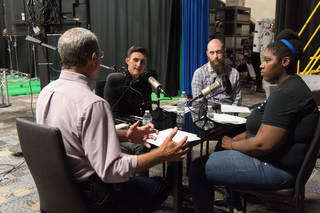
Pat Ryan: And we played that back and that appeared in the episode and it was great, and it was fun. And it was — that’s another example I think of the fun we were able to have with it and not take ourselves too seriously, sometimes NASA does, but we tried not to. I was working through the script in the second Episode and we got to a section where we were talking about how to rehabilitate the sound scriber, this great big machine that, at that point, didn’t work, but had to work in order for their thing to be pulled off. I realized that Greg and another guest, Larry Vrooman kept repeating a technical term, we got to do something in order to explain to the listener what that means. I got an idea about how to do it and I said, okay, why not? Just do it.
[Transition Music]
Larry Vrooman: And I tripped over an article in there about Greg. They had interviewed Greg about his project. And back at that time, he was struggling with, for example, the pinch roller.
Pat Ryan: Wait a minute, there’s that phrase again. He was struggling with the what?
Larry Vrooman: Pinch roller.
Pat Ryan: I feel compelled to pause here. What is a pinch roller? And why does it matter?
Larry Vrooman: Well, the rubber is a compliant tacky surface. And the capstan, the metal machine, the capstan is not. So the capstan is rotated at a speed that the surface contact with the tape achieves the desired tape speed. And then the pinch roller simply ensures intimate contact. And the pinch roller actually does the pulling of the tape.
[Transition Music]
Pat Ryan: And after I let Larry finish explaining what a pinch roller was, we resumed. I went back to, and now on with the countdown. We’d conveyed the information that we wanted to, we had fun at it. And then later on when people said pinch roller, we added ding, so we had — we had a good time.
Alex Perryman: I like that.
Gary Jordan: I like listening to that one.
Alex Perryman: Yeah.
Dan Huot: I mean I would just kind of pile on top, if you haven’t gone through, go listen to that series just because it’s almost like a national treasure story to me. It’s — when you talk about Apollo and everybody’s going to hear about it every single day for the next two months, it’s this event that — it’s this crowning achievement in human history and as such, it’s just been studied, and dissected, and talked about ad nauseam for 50 years. So, when you find something that has just kind of been unearthed, this hidden treasure and then you get to tell the whole story of how this monumental undertaking just to make it so the entire world can enjoy it, that’s really cool, and that’s not something that we get to do very often.
Pat Ryan: No. And in this case, what we all — in the process of doing that, we all — we unearthed another aspect of those tapes that applied to actually another one of our episodes, the recent episode about the restoration of the Apollo Era Mission Control Room. Greg had explained to me that those Mission Control tapes from Apollo 11, the speech in them was understandable when they started playing it, but it wasn’t clear, it had what’s called wow and flutter. Alex, you know.
Alex Perryman: Yes.
Pat Ryan: That’s just — it’s just distortions, right?
Alex Perryman: Right.
Pat Ryan: And the speech was understandable. Anyways, out in the world, there’s a guy named Ben Feist who had worked with Apollo audio in the past, he had his own website where he posted all of the audio from Apollo 17, from the last mission to the moon. But he became aware of John Hansen’s research and got together with an audio engineer from Europe and they wrote a computer program to correct those errors in the sound of the tape. They broke it down — I had to ask him this question three times before I could really understand it. They broke down the audio from the Apollo 11 Mission Control Center into sections that the computer could look at and make corrections based on a reference from a timecode signal. They broke it down into 11 — I’m sorry 8,000 frames per second.
Alex Perryman: Wow.
Pat Ryan: And corrected each of those frames, 8,000 of them per second for the whole however many thousands of hours it was in — just for Apollo 11 to compensate for the wow and the flutter, that audio was used in John Hansen’s project. It’s the audio that we used in the podcast, and it’s also being used in the actual restoration of the Apollo flight control room. Visitors to go in there in the future are going to be presented with a — you know, as if you’re sitting there really during the mission and the audio that they’re going to hear is the audio that Ben Feist and this other guy fixed, if you will, so that it sounds like people were sitting in the room right now, it’s — it’s amazing.
Gary Jordan: Yeah, I love that, that whole — that whole thing. And you can check them all out at exploreApollo.org.
Pat Ryan: ExploreApollo.org.
Gary Jordan: That’s right and that’s where you can — you can hear everything. And how all of it is being used in different products, I love that story so much. And I love the fact that we’re going back and doing more Apollo stuff. Norah put together a cool page on all of the Apollo content that we’re doing. One of my favorites actually was when we did Apollo 8, that one was actually — there was a gap between part 1 and part 2 because like Pat was saying, that was that time where civil servants were on a shutdown and some of us couldn’t work, so we couldn’t post the podcast. But Apollo 8, I specifically remember, it was — I guess more than two years ago at this point, I flew out to Billings, Montana to go interview Frank Borman, but it was for Apollo 1 at the time that was passing the 50th anniversary back in 2017. And when I was there, I got to record some — an interview with him that was actually put together with a series of people because we didn’t actually have the resources to go out and send a whole crew out to interview, so it was just me doing the whole thing, but I remembered that and pulled it for the Apollo 8 Episode, which we recorded with Jennifer Ross-Nazzal, who I’m happy to have on here soon again and for — for the Apollo 1 actual event that we did and we pulled that from the archives as well. And that’s what I think is cool about doing this podcast, as you were saying, you know, we have this format, why not try new things? Let’s try the series. We’ve been doing the live episodes on stage. Dan, you did the one at Comicpalooza. We did them on stage here a couple times. We took panels that were not podcast but would otherwise be cool content anyway and turned them into a podcast, we’re just trying different things and I like that. I think one of my favorites though was Shinedown.
Alex Perryman: That was awesome.
Gary Jordan: That was really cool. Thanks to Jeannie Aquino and Leah Cheshire for that one because that — we all pulled that together. That — I think we were trying to get Shinedown here, but just the timing didn’t work out, but it was still a good conversation that we wanted to have about mental health and it’s a topic that is often unexplored, I think, something we don’t normally talk about.
[Transition Music]
Mark Vande Hei: But there was times when, on a Saturday morning, I might be feeling a little worn out. And I would just be there. I had a laptop in there. I’d start watching a movie. And that was a nice way to just decompress.
Gary Jordan: Just time by yourself. But you had the weekends. Guys, I don’t think you have weekends when you’re touring.
Eric Bass: We generally have, you know, 2 shows on, 1 day off, 3 shows on, 1 day off, 2 shows on, 1 day off. Occasionally, we just got done with 2 days off in a row, which never happens. Which we really enjoyed.
Brent Smith: But we can go get a hamburger.
[Laughter]
Eric Bass: We can go get a hamburger. And we’re—right, yeah.
Brent Smith: We can’t—we’re not up there.
Eric Bass: Actually, I have a question for both Mark, I think it’s for both Mark and Dr. Jim, there. You can both probably chime in on this. So, for me, one of the issues that I have being on tour is my hobbies. So, my hobbies that I love to do, and the things I love to do, really aren’t conducive to being on tour.
[Transition Music]
Gary Jordan: So, I was really happy to have those guys on and really open up. And I think what’s great about that one is after that podcast ended the guests I had there in the studio, Mark Vande Hei and Jim Picano paused for a second and they kind of are like, wow, thank you for letting me be a part of that. They’re like, I didn’t expect it — I don’t know what they expected, but they were, like I didn’t expect it to go that way, and thank you for having me be a part of that, that was — that was really, really cool. Guys, this is Episode 99, we’re coming up on 100 next.
Pat Ryan: What’s next?
Gary Jordan: What’s next? Pat, what are we doing for Episode 100? What is the — what’s coming up?
Pat Ryan: Truth of the matter is we’re still figuring out the exact composition of what the episodes 100 and 101 will be about, but they are both around the 50th anniversary of the first moon landing — of the first humans to land on the moon. We have got — we’ve got a historical discussion in — in the plans. We have another interview with the NASA Administrator to talk not only about the past but probably a good bit about the future. I think that that’s probably what Mr. Bridenstine wants to talk about mostly. We are also in the midst of producing a second episode in which the voices of the people who are leading the human space exploration effort today talk about how Apollo 11 influenced them in their current careers and their thoughts about what we’re going to do next, about returning to the moon slash going forward to the moon in just the next few years, and then going beyond the moon and going to Mars, and God, who knows where else? We’ve talked to some folks from headquarters and a lot of people from here in Houston, since Johnson Space Center is the home of human spaceflight in America, thank you very much, that — we’re going to have those two episodes on July 12th and 19th in recognition of the big anniversary.
Gary Jordan: All right, a lot of great stuff coming up. I think what — again, I’m going to reiterate one of the best parts about doing this is we get to try new things and explore new themes. We’ve done a bunch of — we’ve done series, we’ve done live episodes, we’ve done video episodes, we’ve done episodes from space. That was fun when we did that back in like Episode 6.
Dan Huot: Yeah, that was fun.
Alex Perryman: Yep.
Gary Jordan: And we’ve recorded panels.
Pat Ryan: You know what we haven’t done?
Gary Jordan: What haven’t we done?
Pat Ryan: A musical.
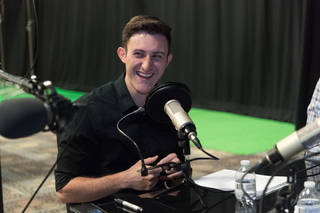
Alex Perryman: A musical?
Gary Jordan: Dan, how’s your — how’s your singing voice?
Dan Huot: Ha ha ha. So – that’ll be the end of the podcast, though right? We’ll are on board with that?
Gary Jordan: Okay, we’ll go out with a bang.
Dan Huot: Go out with something.
Gary Jordan: Yeah, but honestly, I do like checking out some of the reviews that we get, it’s mostly positive and I think we’ve sort of tweaked the way that we do things and try new things along the way. But if you have a suggestion for the podcast, please make sure to say so, #askNASA, leave a review somewhere between I think five and five stars is the best place to rate this podcast and provide any suggestions on what we should do or what we’re doing well and what we’re doing not well, the more reviews, the better. We absolutely love doing this. If you want to hear more Pat, because Pat has been hosting a lot more. And –or if you want to hear more Dan because Dan has been hosting a lot less.
Dan Huot: Yeah, I’m realizing that as I got through this. I’m like man.
Gary Jordan: The idea was to phase you out but we had you here.
Dan Huot: I can take a hint.
[Laughter]
Gary Jordan: Yeah and special thanks to you, the listener, the reason that this has gone on for two years is because we’ve been receiving great feedback from you so far that this is an important thing to do so we will continue to do it. So, thank you so much for listening and downloading and please let us know if you have any more suggestions. I have a cake here that says Houston, We Have Another podcast, let’s dig in, guys.
Alex Perryman: Yes.
Gary Jordan: Here’s to another year.
Pat Ryan: Yay.
[ Applause and Cheers ]
[ Music ]
Gary Jordan: Hey, thanks for sticking around. I hope you enjoyed us reminiscing here on what we’ve done the past year. It’s been a great ride and I really hope we continue this for as long as possible. Again, please leave us a great review, or any kind of critical reviews if you want us to do something a little bit different, or explore more series, or more live stuff, whatever you want, it would really help us to think about what we’re going to be doing and what we’re going to focus on in the future. Nasa.gov/podcast is where you can go to find all of the NASA podcasts, we’re just one of them, otherwise, you can just come to our site, nasa.gov/Johnson/HWHAP, as in Houston, We Have a Podcast. You can see the full transcripts of every episode and there’s a link there where you can find just our Apollo 50th anniversary collection. We usually promote the episode on the NASA Johnson Space Center pages of our — I guess social media presence on Facebook, Twitter, and Instagram. Use the hashtag asked NASA on your favorite platform to submit an idea. Make sure to mention it’s for Houston, We Have a Podcast so we can bring it on. This episode was recorded on June 17th, 2019. Special thanks to Kelly Humphries, Greg Weisman, Bill Stafford, and Norah Moran for all of their help to make this past year possible. And thanks, as always, to Alex Perryman, and to Pat Ryan who are instrumental to happen — make this happen every single week, and to Dan Huot, who has been with us since the very beginning. And thanks to you for listening and helping with the success of the podcast, it helps us to keep this going. We’ll be back with a special episode to celebrate the Apollo 50th Anniversary with Episode 100 of Houston, We Have a Podcast next week. And if you haven’t yet, check out NASA’s newest podcast called NASA Explorers Apollo from NASA’s Goddard Space Flight Center for all of your Apollo 11 50th needs. We’ll leave you with this quick teaser.
[ Music ]
Narrator: July 20th, 1969, the day that changed our place in space forever.
Radio Voice: The Moon is there, in all its splendor.
Narrator: When Neil Armstrong took his small step and our giant leap, the whole world was watching.
Voice 1: You know, it was kind of like hard to believe that this was really happening in front of our eyes.
Voice 2: I remember that my parents were huddled around the television.
Radio Voice: We have a liftoff. 32 minutes past the hour. Liftoff on Apollo 11.
Narrator: Coming soon, NASA Explorers Apollo is a special NASA audio series that tells lesser-known stories behind the missions that took humans to the moon. We examine the things you might not have considered and asked questions like, what are we still learning about our Moon? What happened to the lost data of the Apollo Era? And how are we now preparing to go back? This summer, you can listen to NASA Explorers on Apple podcast, SoundCloud, and Google Play. Until then, you can help NASA tell the story of Apollo by sending us your memories. Visit nasa.gov/ApolloStories to learn more.

